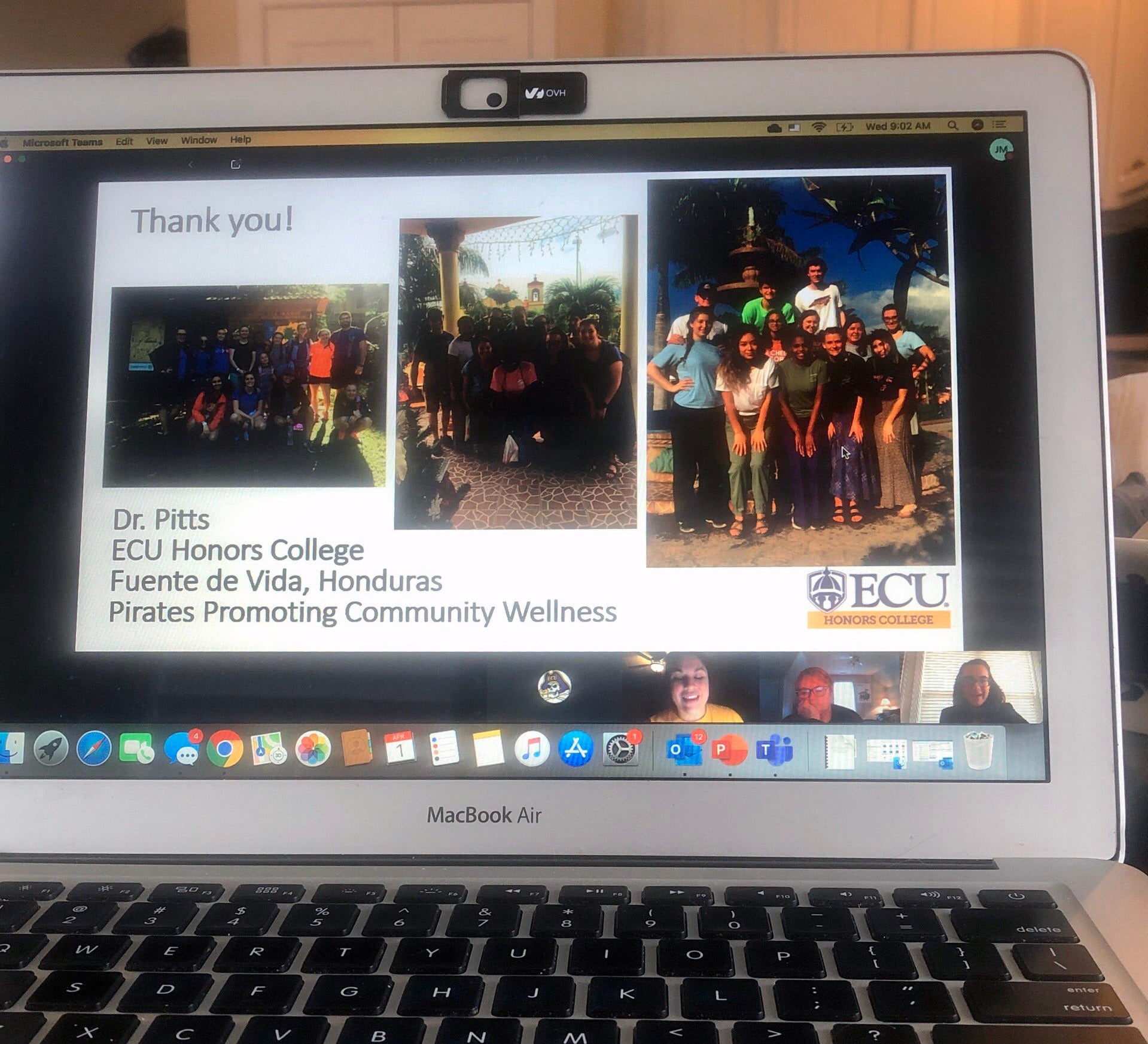Annual RCAW event moves online
Adaptability was the unofficial theme for East Carolina University’s 14th annual Research and Creative Achievement Week (RCAW).
Held March 30 to April 6, the event went completely virtual for the first time in its history, providing nearly 80 undergraduate, graduate and postdoctoral researchers an opportunity to share their work with their peers.
Researchers displayed posters and gave oral presentations online through the university’s instructional platform Canvas, while taking questions from faculty and staff judges.

Undergraduate researcher Jennifer McMains shares her research project with judges online during Research and Creative Achievement Week 2020. RCAW moved to a virtual format for the first time in its history this year. (Contributed photo)
“We have worked hard on this study and it felt rewarding (to show it off),” Ware said. “The online setup was less stressful than a typical poster presentation; there wasn’t the added pressure of face-to-face communication. I was able to give more thoughtful answers.”
Postdoctoral scholar Andrea Pereyra said one of the benefits of a virtual conference was the opportunity to see everyone’s work.
“One of the major drawbacks of big scientific conferences is that you have too many posters or oral presentations happening simultaneously,” she said. “It’s usually difficult to pay a visit to most of them during the time they are up. This year’s setup allowed us to visit the posters before, during and after the official designated hours from the comfort of our homes.”
She added that RCAW gave her a chance to share her work for the first time as a Pirate.
“I was very excited about RCAW,” Pereyra said. “It was going to be my first official presentation since I joined ECU. When the original format was forced to change, I thought, ‘This isn’t an excuse to drop the ball and not participate.’ Being creative and adapting to new scenarios is part of our job description, after all.”
Originally, RCAW 2020 was scheduled to have more than 400 student participants, the largest number in its history. But as social distancing and shelter-in-place measures were put into effect to combat COVID-19, the RCAW leadership team was tasked with figuring out how to host the conference in a new format.
“The response from students and postdocs was overwhelming,” said Lynnsay Marsan, vice chancellor fellow for undergraduate research. “Students and postdocs work hard all year. They applied and received research grants. They juggle life and research. We wanted to give them a chance to showcase all the work they did during the past year.
“Additionally, I feel like it was great practice for what is to come. The world is moving toward virtual spaces; it is a good thing for our scholars to be comfortable with technology and virtual presentations. It is an asset when they go on the job market.”
In addition to receiving feedback from judges, graduate students, postdoctoral scholars and mentors were presented awards for their research. Undergraduate awards were not presented this year due to the alternate format. Award winners included:
- Master’s in Humanities and Fine Arts: Alec Powers, “‘Symphony of Chorales’ by Lucas Foss, A study in collage and musical borrowing”
- Master’s in Mathematics, Physical Sciences, & Engineering: Michael Twarog, “Holocene paleoenvironmental reconstruction of depositional environments on the Sunda Shelf, southwest China Sea, using a multidisciplinary approach”
- Doctoral Dissertation in Social Sciences, Business, & Education: Melissa Decker, “Minority stress, risky behaviors, and sexual scripting among transgender college students: A mixed methods study”
- Doctoral Dissertation in Life Sciences: Brenton Laing, “Adaptations of the hypothalamic arcuate nucleus in response to exercise and hunger”
- 2020 Distinguished Graduate Faculty Mentor: Greg Kearney, Public Health, Brody School of Medicine
- Outstanding Postdoctoral Scholar Presentation: Morgan Milton, “Tackling biofilms and drug resistance: Targeting bacterial response regulators to resensitize multidrug resistant bacteria to antibiotics”
While some research labs have shut down during the pandemic, Pereyra provided words of encouragement for Pirate researchers.
“Scientific research is not a sprint, but a marathon,” she said. “You will encounter many hurdles and challenges along the way. You’ll have to develop the skills to endure and persevere, COVID-19 pandemic or not. So hang in there; it’s doable.”
-by Matt Smith, University Communications